- Home
- Sharyn McCrumb
MacPherson's Lament
MacPherson's Lament Read online
MacPherson's Lament
Sharyn Mccrumb
Elizabeth MacPherson returns from England just in time to become involved in a case involving stolen Confederate gold.
Sharyn McCrumb
MacPherson's Lament
The seventh book in the Elizabeth MacPherson series, 1992
For Joe Blades of Missouri,
now working behind Union lines
ACKNOWLEDGMENTS
There are a number of distinguished and talented members of the legal profession who are no doubt hoping that I will not drag their names into these proceedings, but since no good deed goes unpunished, I would like to thank the following attorneys for conspiring in the plotting of this novel. Any legal errors herein are the result of the author’s ignoring the advice of counsel. Special thanks to Ohio Judge Judith A. Cross, who egged me on in the very beginning, offering inspired-one might almost say “fiendish”-suggestions on how to get a young attorney into serious trouble.
Additional legal advice was generously provided by attorneys Julian Cannell; H. Gregory Campbell, Jr; David Hood; Erik Hildinger; and by Virginia State Senator Madison Marye.
Why were they all going out to war?
He brooded a moment. It wasn’t slavery.
That stale red-herring of Yankee knavery.
Nor even states-rights, at least not solely,
But something so dim that it must be holy.
– STEPHEN VINCENT BENÉT,
John Brown’s Body, Book 2
PROLOGUE
RICHMOND-APRIL 2, 1865
GABRIEL HAWKS RECKONED that his extra pair of socks might dry before sunset on the warm deck of the Virginia, since the day was fine. It had been as good a day as a body could ask for in early spring-the sky like Jamaica water, with just enough wind to tickle the canvas and to bring a smell of flowers and new-plowed ground from the adjoining land. Captain Dunnington had tried to spoil the afternoon by ordering them all ashore to drill and march on the riverbank, but even that was tolerable on as fair a day as this. Better than staying crammed on the ironclad within quarters too narrow to swing a cat in-and nothing to do but think about being hungry on half rations. And listen to the rumble of distant cannons.
Gabe had never figured on being in any navy. In the sixteen years of his life before the war, he’d lived in the shadow of Bear Mountain in Giles County, Virginia, and he’d hardly even seen enough water to float a ship in. When the fighting commenced, he’d joined up with four other fellows from home.
He grew up on a small mountain farm, mostly apple orchards and a few head of cattle in steep pastureland. The Hawkses were hard-pressed to feed even the younguns on what they produced, so they never owned slaves. Never needed any on a small place, and didn’t much approve of that sort of soft life anyhow.
Gabe hadn’t made up his mind about which side he favored in the war when Fort Sumter was fired on. By a margin of two to one the Virginia legislature had voted not to secede, and that was all right with him. But things were different two weeks later when Lincoln called on the states for militia to put down the insurrection: seventy-five thousand men were ordered to invade South Carolina and the other seceding states. Gabe couldn’t hold with that-sending invaders onto a sister state’s land. His mother’s people had come from Carolina, down Salem way. So when Virginia joined the Confederacy, so did Gabriel Hawks.
Of course he hadn’t figured on getting to be an officer. The South had seven military academies full of rich men’s sons, and they were the ones commissioned. Gabe, a small and wiry mountain boy with Bible learning and no family influence to draw on, had been mustered into the infantry at the lowest rank. (And furnish your own clothes and weapons.) Still, he had been proud to be a private in the Stonewall Brigade. The Shenandoah Valley boys had cut such a swath through the Federals’ ranks that they reckoned they could have fought the angels themselves to a standstill. But when General Jackson took a bullet two years back at Chancellorsville, he took the charm with him to the hereafter. Two of the boys from home had died after that, and Gabe had ended up in hospital with a burning fever that left him wasted and looking like a scarecrow. After he was well enough to be released, he’d been given new orders: a transfer to the navy.
At first he had been right glad of the change. If he couldn’t be a hero in Jeb Stuart’s cavalry, then he’d see what life was like at sea. No more marching in worn-out shoes, leaving your blood behind on the snow of the railroad tracks, and damned little chance to get shot, either. Maybe on a ship there’d be something besides hardtack to eat. Maybe they’d just sail right away from the whole war. He’d heard Confederate ships had been to Europe, the Caribbean-even the Pacific Ocean.
But he hadn’t got far. Here he was at the mouth of the James River, within spitting distance of Richmond. The Virginia was an ironclad, the flagship of a fleet of eight, charged with the duty of guarding the capital from invasion by water. The three ironclads were moored across the only available channel in the James, their might bolstered by five wooden gunships and the naval batteries ashore. The crews remained there-cramped, hungry, and landlocked, waiting for it all to end.
Tom Bridgeford, who was standing at the rails looking out over the river, called out, “Come and wave, boys! Flag-of-truce boat coming by!”
Gabriel Hawks looked over the side as the little boat churned its way upriver. It was overflowing with newly released prisoners of war being repatriated to the Confederacy in a prisoner exchange with the Union. The freed soldiers laughed and whooped and let out a mighty yell when they saw the Confederate flag on the Virginia’s mast. Gabe waved to the cheering throng, but he did not smile.
“Damn fools,” he said to Bridgeford. “What do they think we’re going to feed them?”
“I don’t reckon they know how bad it is,” said Bridgeford as he watched them go.
“Then what do they reckon that booming is? A thunderstorm?”
The low rumble of cannon fire had been echoing across the water all afternoon. He’d heard talk of a battle in Petersburg, but that was nothing new. The fighting had been within earshot of Richmond for weeks now, but still the lines held, and spring came and church bells tolled, just like nothing was amiss.
Gabe Hawks grinned at lanky, redheaded Tom Bridgeford. “Why, I figured that rumbling was just my stomach complaining that my throat’s been cut. It’s been so long since I’ve sent any food down there.”
“Too bad you’re not back on your piss-ant farm,” said Bridgeford. “You could just go out in the woods and shoot you something.”
“I would, too,” said Gabe. Bridgeford was a carpet knight from Wilmington who thought that potatoes grew on trees. “I reckon I could shoot me a wild pig that could feed-”
But Bridgeford wasn’t listening. “Look what’s coming!” he said. “Steamer, pulling alongside.” A uniformed man stood waiting to board the ironclad. He looked grim and he held a package tightly under his arm as he stared up at the flag.
“What do you reckon he wants?” asked Gabe. He was only a master’s mate, and the rituals of the flagship were strange to him.
Bridgeford sneered at such a tomfool question. “Admiral Semmes is aboard, isn’t he? They just were sending dinner along to his cabin as I came up. It’s probably some military intelligence for him.”
“Maybe we’re going to attack!” Gabe was tired of sitting in the river, listening to the war in echoes.
“In that case, let’s play a hand of cards,” said Bridgeford, reaching in his pocket for the worn and crumpled deck that had almost outlasted the war. “Might as well enjoy what’s left of a perfect day.”
“Play cards on Sunday?” cried Gabe.
Bridgeford shook his head. “Hawks, they’re killing people in P
etersburg. Do you think the Lord will notice a friendly hand of poker?”
They were still at it when twilight came and the order was given to get the ships under way for Drewry’s Bluff.
“What are we going to do up there?” Gabe asked as a seaman hurried past.
The sailor stopped, wide-eyed, and whispered, “I overheard the admiral talking to his messenger. He says he’s going to destroy the fleet!”
“Just before the battle, Mother”
– GEORGE FREDERICK ROOT,
Civil War song
CHAPTER 1
Edinburgh
June 8, 1992
Dear Bill,
There is a silly rumor going around the family that you have graduated from law school, passed the bar exam, and are actually setting yourself up in practice as a partner. I suppose that this will settle the betting pool once and for all. I wonder which one of us picked this decade as the probable date of your graduation! Of course I told Geoffrey that he hadn’t a hope of winning in any case; I don’t even think they’d let you stay in law school until 2041. My guess is Mother will win the pot; I’m sure she came the closest to the correct year. That’s probably why she’s gloating about your newly elevated status. A partner, indeed! Reading between the lines of Mother’s propaganda, I deduced that you did not get hired by a real law firm and are therefore striking it out on your own to chase ambulances and draw up wills in the unsuspecting city of Danville, Virginia.
As I recall, your graduation gift to me in days gone by was an IOU, which I could with perfect justice return to you on the present occasion, but I am more gracious than you (also more solvent), and so enclosed you will find a check for five hundred dollars, which I hope you will use to buy a desk or other bits of office furniture for your new establishment, but if you’d rather buy a thousand baseball cards or a collection of Perry Mason videos to instruct you in trial procedure or whatever else takes your fancy, then you have my blessing. (Seriously, Bill, we are all very happy for you. Keep me posted about your most exciting cases. If you can afford the overseas postal rates.)
No doubt you are all aquiver to learn how your baby sister is doing in the capitals of Europe. Well, the capital of Scotland, anyhow. And the answer is: very well, thank you. Cameron is back from the high seas and he’s keeping busy with his flippered friends at the lab while I am attempting to put my Ph.D. in forensic anthropology to some practical use, short of grave-robbing-a time-honored profession in Edinburgh, as you doubtless know. The way Cousin Geoffrey keeps going on about Burke and Hare, you’d think he had stock in the company.
In conclusion, I have just one teensy question about this new law practice of yours. Mother says in her letter that you have gone into partnership with A. P. Hill, which is charming for both of you, I’m sure, except that I had the distinct impression that A. P. Hill had been dead for a hundred and twenty-seven years. I take it, then, that you are the junior partner? I await your explanation of this phenomenon with bated breath.
May you please the Court,
Elizabeth
“Letter from my sister,” said Bill MacPherson to his new law partner, the aforementioned A. P. Hill. “I thought you might like to read it. I’ve already cashed the check, though.”
A. P. Hill scanned the letter without a trace of a smile. “Dead for a hundred and twenty-seven years. People always say that when they hear my name.”
“Surely not always,” murmured Bill. “There are probably scads of Yankees who don’t recognize it at all. Anyway, if it bothers you, you could always use your first name. Amy Hill is a perfectly good name.”
“Amy Hill isn’t auspicious enough for a practicing attorney,” she said, frowning.
“How about using your middle name? Powell is okay. And it’s what your folks call you, isn’t it?”
His partner shrugged. “Only because I refuse to let anyone call me Amy. I just think initials have a more aggressive and professional sound. Especially for someone as harmless looking as I am.”
Bill observed his partner appraisingly. She was just over five feet tall, with short straw-colored hair and the sort of angelic face that necessitated the showing of her ID card rather oftener than most people her age were required to do. “You do put one in mind of a high school cheerleader,” Bill conceded. “At first glance, I mean. For those who haven’t seen your pit-bull tactics in trial class. But that gleam of blood lust in your green eyes ought to tip off anybody who’s paying attention. I expect you come by it honestly, what with all those cavalry charges in your bloodlines.”
Bill was referring to the original A. P. Hill, one of Robert E. Lee’s generals during the Civil War. The present bearer of that name was the warrior’s great-great-granddaughter, who had chosen to fight her battles in court rather than at the head of an army. The family resemblance was there, though, in her no-nonsense manner and in the easy self-confidence that she displayed in legal combat. Her grades in law school had been better than Bill’s, and he still marveled at his good fortune that she had agreed to go into partnership with him. He was sure she could have snared a lucrative position in an established law firm if she’d wanted one. But she said that if she didn’t strike out on her own, the family would make her practice law with her cousin Stinky. She wanted to make it through her own efforts, she said, without family influence.
Bill had never met his law partner’s family, but he knew that she came from somewhere west of Roanoke, and, although she didn’t speak of it, he could well imagine a rural law practice in southwest Virginia, replete with drunk drivers and bad-check cases. There would already be a couple of well-established attorneys there who would get all the business, leaving newcomers to scramble for the lowest-paying leftovers. Here in Danville there was at least a chance of some criminal cases, which were A.P.’s specialty, and a population of sufficient size to provide them with the more prosaic legal business of wills and no-fault divorces, which would generate most of the revenue for the firm of two.
Fortunately their rent was modest. The newly graduated lawyers had set up headquarters downtown in an old bank building which now housed a florist shop, a travel agency, and a number of small apartments on the two upper floors, one of which had also been rented by Bill MacPherson, because it was the cheapest accommodation he could find. A.P., who preferred to see criminals in court rather than in the stairwell of her building, had moved into a more secure and luxurious high rise on the outskirts of town.
The law office consisted of three small rooms partitioned with wallboard out of one large one-on the landlord’s theory that three rabbit hutches ought to rent for more than one decent-sized room. The frosted glass door opened into a reception area, containing as yet no secretary. On either side of this waiting room, doors led to the tiny offices of Bill MacPherson and A. P. Hill, each furnished with a secondhand desk and bookcase, law books, a typewriter, and very little else. The new attorneys had their independence, an optimism that might pass for recklessness in more conservative circles, and less than a thousand dollars to get on with. Business had better become brisk very soon.
“So, partner, how was your morning?” Bill asked.
“All right, I guess,” said A. P. Hill. “I went down to the courthouse and introduced myself around. I put my name on the list of attorneys who can be assigned to court-appointed cases. How did things go here?”
“Crowd control wasn’t a problem. I called the business college to see if we could get a part-time secretary that we could afford. They’re sending over an applicant this afternoon.”
“Good,” said A.P. “I’ll interview her. You’d fall for the first hard-luck story you heard, without bothering to find out if she could type.”
“Well, ask her if she suffers from claustrophobia.” He looked at the walls, little more than an arm’s length away. “It could be a liability in this office.”
“This is what we can afford,” said A.P. “If we don’t get some business soon, we may be operating out of a packing crate on the sidewalk.”
“Probably against city ordinances,” said Bill. “I would offer to go and chase an ambulance, but unless I get my car tuned up, I probably couldn’t catch one.”
A.P. glanced again at Elizabeth’s letter. “At least we got some more money. I hope you remember to thank your sister for this.”
“It’s high on my list of things to do this afternoon,” Bill promised. He held up a cardboard box. “Speaking of that check, I also got a little something to brighten up the office. I went out to deposit the check from my sister, and as I was coming back, I happened to look into that flea-market place… I’ll just put it on the table in the corner.” He took his newly purchased prize out of its wrappings of newspaper and set it on the white plastic table scrounged from Goodwill. “What do you think?”
“I think it’s dead,” said A. P. Hill. “Did you actually pay money for that monstrosity?”
“Yes. Elizabeth suggested that I spend the money on office furniture, but when I saw this fellow here at the flea market, I just had to have him.”
“What flea market?”
“That store down on the corner. I think it used to be a grocery store, but now some antique dealers have set up stalls inside. So, anyhow, I went in, just out of curiosity-”
“Do they have any old weapons in there? Swords, things like that?”
“I didn’t notice,” said Bill. “Probably. The place is full of junk. Why?”
“Oh, no reason. So you found this dead animal in drag-”
“The taxidermist says that he’s an authentic Virginia groundhog. And he wasn’t killed for display. He’s a road kill,” Bill added happily. “And his little black robe is handmade by the taxidermist’s wife. Isn’t he marvelous?”

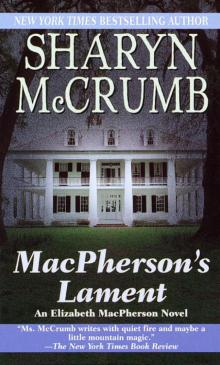 Elizabeth MacPherson 07 - MacPherson’s Lament
Elizabeth MacPherson 07 - MacPherson’s Lament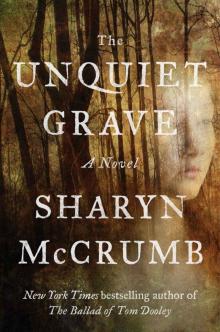 The Unquiet Grave: A Novel
The Unquiet Grave: A Novel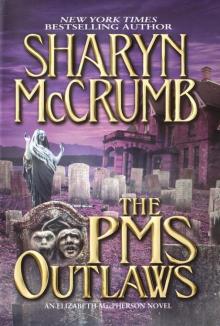 The PMS Outlaws: An Elizabeth MacPherson Novel
The PMS Outlaws: An Elizabeth MacPherson Novel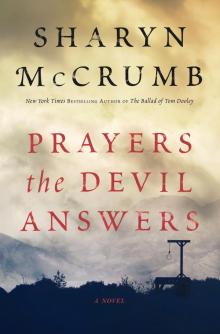 Prayers the Devil Answers
Prayers the Devil Answers Paying the Piper
Paying the Piper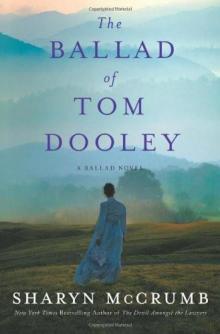 The Ballad of Tom Dooley: A Ballad Novel
The Ballad of Tom Dooley: A Ballad Novel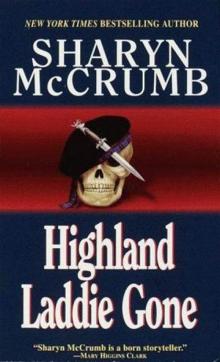 Highland Laddie Gone
Highland Laddie Gone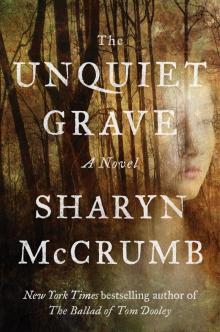 The Unquiet Grave
The Unquiet Grave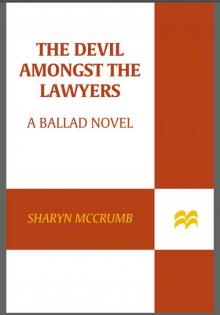 The Devil Amongst the Lawyers
The Devil Amongst the Lawyers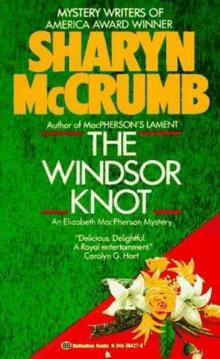 The Windsor Knot
The Windsor Knot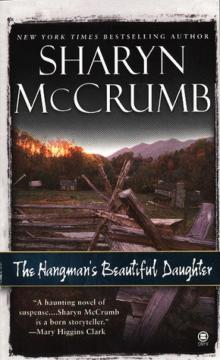 The Hangman's Beautiful Daughter
The Hangman's Beautiful Daughter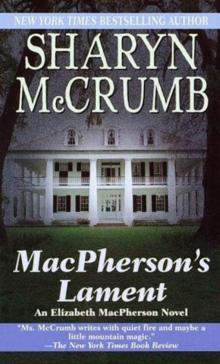 MacPherson's Lament
MacPherson's Lament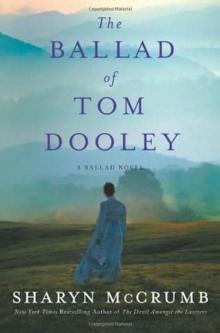 The Ballad of Tom Dooley
The Ballad of Tom Dooley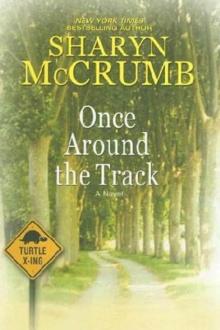 Once Around the Track
Once Around the Track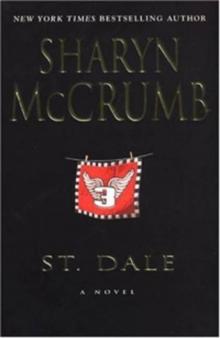 St. Dale
St. Dale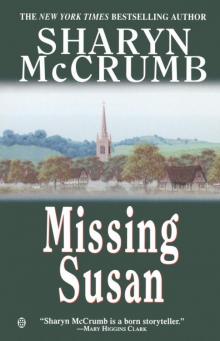 Elizabeth MacPherson 06 - Missing Susan
Elizabeth MacPherson 06 - Missing Susan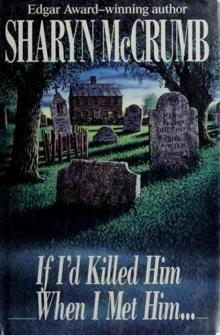 If I'd Killed Him When I Met Him…
If I'd Killed Him When I Met Him…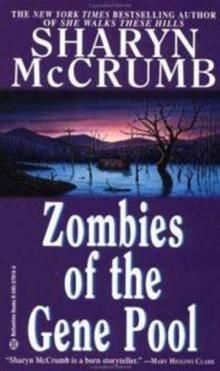 Zombies of the Gene Pool
Zombies of the Gene Pool Bimbos of the Death Sun
Bimbos of the Death Sun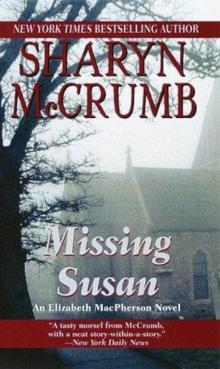 Missing Susan
Missing Susan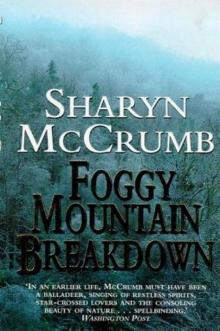 Foggy Mountain Breakdown and Other Stories
Foggy Mountain Breakdown and Other Stories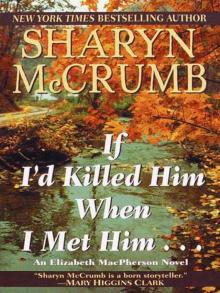 If I'd Killed Him When I Met Him
If I'd Killed Him When I Met Him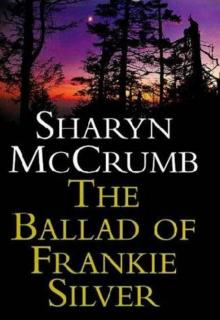 The Ballad of Frankie Silver
The Ballad of Frankie Silver Lovely In Her Bones
Lovely In Her Bones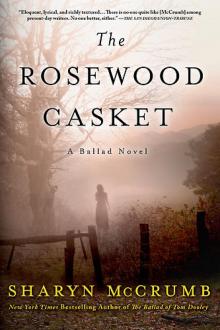 The Rosewood Casket
The Rosewood Casket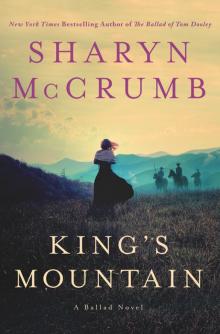 King's Mountain
King's Mountain